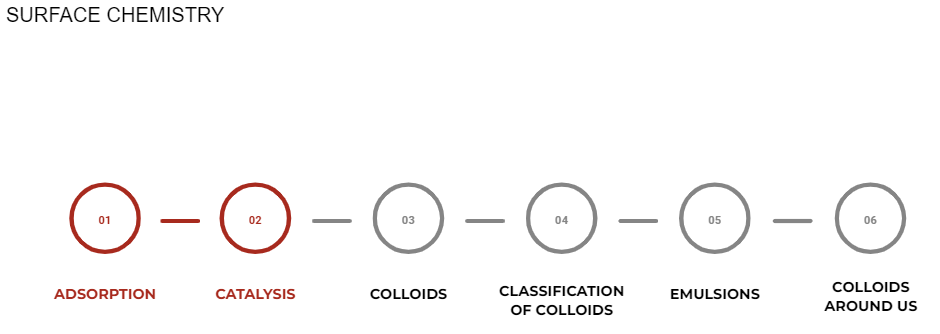NEET Exam > NEET Notes > Physical Chemistry for NEET > Index: Surface chemistry
Index: Surface chemistry | Physical Chemistry for NEET PDF Download

1. Introduction
2. Adsorption
- Doc: Surface Chemistry & Adsorption
- Test: Adsorption
3. Types of adsorption
4. Adsorption of isotherms
5. Catalysis
- Test: Catalysis
6. Homogeneous and Heterogeneous catalysis
- Video: Catalysis (Homogeneous and Heterogeneous Catalysis)
- Video: Adsorption Theory of Heterogeneous Catalysis
7. Enzyme catalysis
- Video: Enzyme Catalysis
8. Colloids
- Video: What are Colloids?
- Video: Colloids & its Classification
- Video: Colloids Classification of Physical State
- Video: Classification of Colloids: Lyophobic & Lyophillic
- Video: Methods of Preparation of Colloids
- Video: Purification of Colloidal Solutions
- Video: Properties of Colloidal Solutions
- Video: Multimolecular, Macromolecular & Associated Colloids
- Doc: Colloids & its Classification
- Doc: Classification and Phases of Colloids
- Doc: Preparation, Purification & Properties of Colloidal Solutions
- Doc: Examples of Colloids
- Test: Properties: Colloids
- Test: Types: Colloids
9. Emulsions
- Video: What are Emulsions?
- Doc: Emulsions and their Properties
- Doc: Emulsions and Colloids around Us
- Test: Emulsions
10. Bredig’s arc method
11. NEET Questions
- Test: 28 Year NEET Questions: Surface Chemistry
- Doc: NEET Previous Year Questions (2014-21): Surface Chemistry
12. NCERT Material
- Doc: NCERT Textbook: Surface Chemistry
- Doc: NCERT Solutions: Surface Chemistry
- Doc: NCERT Exemplar - Surface Chemistry
13. Chapter tests and other docs
- Doc: Short & Long Answer Question: Surface Chemistry- 1
- Doc: Short & Long Answer Question: Surface Chemistry- 2
- Doc: Short & Long Answer Question: Surface Chemistry- 3
- Doc: Solved Examples : Surface Chemistry (IIT-JEE & AIPMT)
- Test: Surface Chemistry- Assertion & Reason Type Questions
- Test: Surface Chemistry- Case Based Type Questions
- Test: Surface Chemistry- 1
- Test: Surface Chemistry- 2
- Test: Level - 1 Surface Chemistry - 1
- Test: Level - 1 Surface Chemistry - 2
- Test: Level - 2 Surface Chemistry - 1
- Test: Level - 2 Surface Chemistry - 2
- Test: Previous Year Questions - Surface Chemistry (Level 1)
- Test: Surface Chemistry - From Past 28 Years Questions
- Test: Surface Chemistry
- Test: Surface Chemistry
- Doc: Important Formulas & Rapid Revision: Surface Chemistry
- Doc: Mind Map: Surface Chemistry
The document Index: Surface chemistry | Physical Chemistry for NEET is a part of the NEET Course Physical Chemistry for NEET.
All you need of NEET at this link: NEET
|
117 videos|226 docs|237 tests
|
FAQs on Index: Surface chemistry - Physical Chemistry for NEET
| 1. What is surface chemistry? |  |
Ans. Surface chemistry is a branch of chemistry that deals with the study of chemical reactions occurring at the interface of two phases, typically between a solid and a liquid or gas. It involves the understanding of various phenomena such as adsorption, catalysis, and corrosion, which play a crucial role in industrial processes and natural systems.
| 2. What is adsorption? |  |
Ans. Adsorption refers to the process where molecules or ions from a gas or liquid phase adhere to the surface of a solid substance. It occurs due to the attractive forces between the surface and the adsorbate molecules. Adsorption is commonly used in various applications such as wastewater treatment, purification processes, and gas separation.
| 3. What is catalysis in surface chemistry? |  |
Ans. Catalysis in surface chemistry refers to the process where a substance, known as a catalyst, enhances the rate of a chemical reaction without being consumed in the reaction itself. In surface catalysis, the reactants are adsorbed onto the surface of the catalyst, leading to the formation of intermediate species that facilitate the reaction. This phenomenon is widely used in industries for the production of chemicals, fuels, and pharmaceuticals.
| 4. How does surface chemistry play a role in corrosion? |  |
Ans. Surface chemistry plays a significant role in corrosion, which is the process of gradual deterioration of a material due to chemical reactions with its environment. The interaction between the corrosive agents and the surface of the material involves various surface chemical reactions, including adsorption, dissolution, and deposition of corrosion products. Understanding the surface chemistry of corrosion helps in developing effective corrosion prevention strategies and materials.
| 5. What are some practical applications of surface chemistry? |  |
Ans. Surface chemistry has numerous practical applications. It is used in the manufacturing of catalysts for industrial processes, such as the production of ammonia or petroleum refining. Surface chemistry also finds applications in the development of advanced materials with specific surface properties, such as superhydrophobic coatings or self-cleaning surfaces. Additionally, it plays a crucial role in environmental science, including water and air pollution control, as well as in the field of biotechnology for drug delivery systems and biosensors.
Related Searches
















